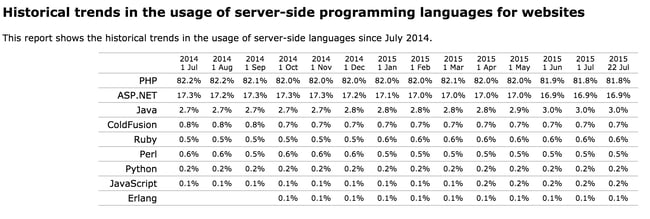This is the first in a series of blogs on PHP for the Enterprise by Eden Watt, Able-One VP of Application Innovation with Guest Blogger, Amy Anderson, Zend Director of Business Development.
With millions of sites and millions of developers using PHP, it’s a technology that should interest everyone in IT. This first blog provides an introduction and in subsequent blogs, we’ll review the features of PHP and Zend Server that are most valuable for business users.
PHP is an open source development language designed for web and mobile applications. Originally, built as a scripting language for “personal home pages” (as in, “PHP”) the language has proven itself adaptable, resilient, and future-proof. According to UBM, “More than 240 million websites, including those of ADP, Facebook, NYSE Euronext and Toyota, are written largely in PHP”.
Many organizations have some PHP scripting embedded within their websites – especially since popular content management solutions, such as Wordpress, Magento, Joomla, and Drupal, use PHP under the covers and to extend the base package – while others may have a larger, more strategic commitment to an Enterprise PHP platform or framework for their applications.
This Chart shows widespread use of PHP as a server-side programming language for deploying web applications.
PHP continues to expand in popularity and usage because it has matured along with the Internet itself. As businesses have developed requirements for increased levels of security, performance, and reliability, PHP has stepped up to the challenge. And because it is a dynamic language, it is well suited to mobile development as well.
There are many use cases for PHP, including Content Management Systems such as Drupal, Wordpress, and Joomla, Commerce solutions such as Magento and X-Cart, and Customer Relationship Management solutions such as SugarCRM and OroCRM. A fourth use case is perhaps the most relevant for a majority of established businesses: application modernization.
As various computing trends have come and gone—from mainframe to client-server to web-enabled—businesses have invested in application environments that all too often resulted in a dead end for the business logic and data structures contained within those systems. And yet, those environments continue to deliver value to business through high productivity and low total cost of ownership. By using PHP as a front-end to those back office applications, businesses can leave the business logic and data where it is, and still deliver the information business users demand on the devices that are currently trending, whether it’s a tablet, a phone, or a smart watch.
PHP brings many advantages to these solutions. First, the cost of entry is relatively low as compared to heavier application environments like Java. Second, there are millions of PHP developers worldwide, and they are well networked together, so businesses can identify and hire critical skills regardless of location.
And finally, PHP has evolved into a robust, enterprise-class environment that delivers the highest levels of security, performance, and reliability. Zend Technologies, whose founders were two of the original authors of PHP, delivers a commercial-grade application platform for PHP that provides enterprise class features, improved ease of use, and of course, service and support that is unparalleled in the PHP community.
If you’re interested in finding out if PHP and Zend Technologies is a good fit for your enterprise, please get in touch with us.

